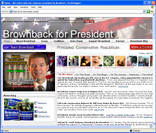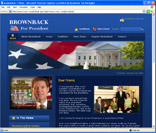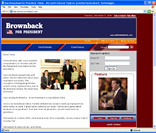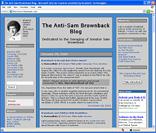



www.brownback.com
April 20, 2007 grab
www.brownback.com
Jan. 23, 2007 grab
www.brownback.com
Dec. 5, 2006 grab
www.brownback.com
Nov. 15, 2005 grab

www,theantisam.com
Jan. 21, 2005 grab
| In Brief - Elected to the U.S. Senate in 1996 (in the Republican primary he defeated Shiela Frahm, who had been appointed to complete Bob Dole's term); elected to a full six year term in 1998; re-elected in 2004. Elected to the U.S. House in 1994, representing Kansas' 2nd CD. Selected as Kansas Secretary of Agriculture in 1986 and served in the position for seven years; one year as a White House fellow, 1990-91. Co-author of Kansas Agricultural Law (Lone Tree Pub Co, 1994). Law degree from the University of Kansas, 1982; B.S. in Agricultural Economics from Kansas State University, 1979. Born September 12, 1956 in KS. [Timeline]. |
Notes
On Dec. 4, 2006 Sen. Sam
Brownback announced
formation of a presidential exploratory committee, stating that that he
had decided "after much prayerful consideration, to consider a bid for
the Republican nomination for the presidency." A month and a half
later, on Jan. 20, 2007, he formally declared
his candidacy in Topeka. Brownback's campaign literature describes
him as "A conservative you can trust."
"Renew the Society and
Renew the Culture"
In Dec. 2005, asked by C-SPAN's
Brian Lamb on "Q&A" why he wants to be president someday, Brownback
responded that "at its core I think we have to renew the society and renew
the culture." In his years in Congress Brownback has compiled an
impeccable record on social conservative issues. Since 2002 he has
been chairman of the Values Action Team, which provides an important interface
between Capitol Hill and organizations on the religious right. He
has been a leading voice against embryonic stem cell research ("taxpayer-subsidized
destruction of human embryos). Following the Janet Jackson Superbowl
incident in 2004, he quickly introduced the Broadcast Decency Enforcement
Act of 2004 (S. 2056), a bill to "increase the penalties for violations
by television and radio broadcasters of the prohibitions against transmission
of obscene, indecent, and profane language."
Just in the 109th Congress, Brownback sponsored bills including the Unborn Child Pain Awareness Act (S. 51) which would "require abortion providers to notify a woman who is seeking an abortion 20 weeks after fertilization of the growing medical evidence that the unborn child in her womb can feel severe and extreme pain during an abortion procedure;" the Broadcast Decency Enforcement Act of 2005 (S. 193); the Human Cloning Prohibition Act of 2005 (S. 658); and a marriage amendment to the U.S. Constitution ("Marriage in the United States shall consist only of the union of a man and a woman.") (S.J. Res. 13). He used his position as chairman of the Senate Judiciary Subcommittee on the Constitution, Civil Rights and Property Rights to hold hearings on such issues as "whether federal and state marriage protection initiatives are vulnerable to judicial activism" (April 13, 2005) and "pornography’s effects on marriage, families, and children" (Nov. 10, 2005). In October 2005, Brownback's skepticism about President Bush's Supreme Court nominee Harriet Miers was a key factor that contributed to her withdrawing from consideration.
Fiscal Responsibility
Brownback has for several
years advanced the idea of a Commission on the Accountability and Review
of Federal Agencies (CARFA), modeled on the Base Realignment and Closure
Commission, to eliminate outdated federal programs and agencies.
Under the proposal, which he first introduced in 2002, a 12-member commission
would conduct a two-year review and then make recommendations on which
agencies and programs should be eliminated or realigned. On October
25, 2005 Brownback joined a group of seven Republican Senators, the Senate
"Fiscal Watch Team," who announced a package of offsets to counter spending
on Hurricane Katrina and Rita relief and recovery. The package included
a half dozen items including a two-year delay in implementation of the
Medicare prescription drug benefit and a 5 percent cut in non-security
federal spending programs. He also advocates a flat tax.
International Concerns
In January 2005 Senate Majority
Leader Bill Frist appointed Brownback chairman of the Helsinki
Commission (formally know as the Commission on Security and Cooperation
in Europe; this independent agency is the United States' interface with
55-member Organization on Security and Cooperation in Europe). Starting
in the late 1990s, Brownback took an active interest in confronting the
gross human rights violations in Sudan, including slavery and genocide,
that grew out of that nation's civil war, and more recently, in December
2005, he and Sen. Dick Durbin (D-IL) visited Congo (DRC), Rwanda and Kenya
primarily to examine humanitarian conditions.
A Boost from Iowa?
Brownback faced significant
challenges; he was not well known to most Americans, his fundraising ability
was modest, and he needed show that he can broaden his appeal beyond social
conservatives. Chuck Hurley, a friend from law school days, stated
that Brownback "comes across as reasonable and smart, not pugnacious or
combative." "He wears well on moderates," Hurley said. Brownback's
Kansas roots, his experience with agricultural issues, and his appeal to
social conservatives offered a foundation to help him do well in the first-in-the-nation
Iowa caucuses, which would be essential to a successful campaign.
Straw Poll Setback
Brownback placed a major
emphasis on Iowa, making 36 visits and spending 57 days in Iowa from December
2004 through August 11, 2007, the date of the Straw Poll in Ames.
His campaign made a significant investment in the event, but when the results
were tallied Romney had won with 4,516 votes (31.6 %), followed by Huckabee
with 2,587 votes (18.1 %); Brownback finished third with 2,192 votes (15.3
%). Huckabee had spent significantly less than Brownback and gained
a boost from the event. For the Brownback campaign it was a significant
setback. Although he did not leave the race immediately, as did former
Gov. Tommy Thompson, contributions dropped off and on October 19 he announced
his withdrawal from the race.
Speeches
Announcement of End of Candidacy
at the State Capitol, Room 514 South in Topeka, KS, October 19, 2007. [transcript]
Republican Party of Iowa's
Lincoln Day Dinner in Des Moines, IA, April 14, 2007. [transcript]
Announcement Speech, Heritage
Hall, Topeka, KS, January 20, 2007. [transcript]
Values Voter Summit 2006,
Washington, DC, September 22, 2006. [transcript]
Articles
Noam Scheiber. "The
Apostle." The New Republic. December 18, 2006. (cover
story)
Jeff Sharlet. "God's
Senator." Rolling
Stone. January 25, 2006.
On C-SPAN's "Q&A,"
program date December 25, 2005.
Photos
Jan.
20, 2007-Declaring his candidacy in Topeka, KS.
Sept.
22, 2006-Washington Briefing: 2006 Values Voter Summit.
Sept.
21, 2006-Joining other Senators to urge quick action on Darfur.
Aug.
17, 2006-Iowa State Fair in Des Moines, Iowa. [a
Brownback aide]
June
16, 2006-GOParty Picnic in Des Moines, Iowa. [Iowa
Republican Party]
May
17, 2006-Joining other congressmen speaking
in support of plug-in hybrid vehicles.
Oct.
11-12, 2005-At The New Hampshire Institute of Politics at Saint Anselm
College in Manchester, NH. [The New
Hampshire Institute of Politics]
Oct.
8, 2005-Addresses Iowans for Tax Relief's Iowa Taxpayers' Day in Des
Moines, Iowa. [Iowans for Tax Relief]
Finances
|
Contributions
|
Transfers
|
Total Receipts
|
Total Disbursements
|
Cash on
Hand
|
|
| YTD through Sep. 30 |
$3,541,016.82
|
$575,000.00
|
$4,235,333.29
|
$4,140,659.71
|
$ 94,653.58
|
| 3rd Q 2007 (Jul. 1-Sep. 30) |
$
817,285.86
|
--
|
$ 925,745.22
|
$1,278,856.03
|
$ 94,653.58
|
| 2nd Q 2007 (Apr. 1-Jun. 30) |
$1,419,943.38
|
--
|
$1,425,766.58
|
$1,798,492.71
|
$460,236.39
|
|
1st Q 2007
(Jan. 1-Mar. 31)
|
$1,291,023.88
|
$575,000.00
|
$1,871,057.79
|
$1,064,431.52
|
$806,626.27
|
On the Web
| Copyright © 2005, 2006, 2007 Eric M. Appleman/Democracy in Action |  |